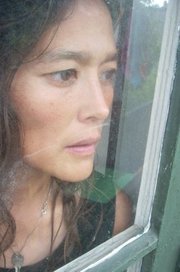P&W-SPONSORED WRITER: Delia Tomino Nakayama
HOST ORGANIZATION: St. Anna's Episcopal Church
From October 18 to November 15, 2010, poet Delia Tomino Nakayama held five free "PoetryProcess" workshops at St. Anna's Episcopal Church in New Orleans. We asked Nakayama how she approaches workshopping.
 What's your writing critique philosophy?
What's your writing critique philosophy?
A lot of good comes from refraining from giving critique in workshops if the students are open to such an idea. An air of unconditionality then permeates the environment, and people can really go places they don't normally go and explore different ways of writing without feeling scrutinized. “Good” examples, writing exercises, and time spent writing together in silence can guide people in a gentle way to reach their potential. I also feel that the answers people are looking for regarding their work are usually inside of them, though it might take some time to find. Those answers are apt to be more appropriate than another person's, as the writer really knows the writing.
What is the strangest question you’ve received from a student?
“Do I really belong here?”
My answer was: “Of course!”
This person didn't really feel like a “writer” yet. Anyone who wants to write, whether they have or not in the past, “belongs” in any workshop I give.
How does teaching inform your writing and vice versa?
The knowledge I have as a writer and human being comes out as I teach, and though I knew that I “knew” something, my insights go through an actualization process where I am verbalizing what I know viscerally/subconsciously.
I think about how it was when I was starting out as a poet and writer, and how I doubted myself. I also remember getting bad and discouraging critiques. That process of development as a writer informs how I teach. I try to be as sensitive as possible to each student and give people a lot of space to move in, so they don't feel monitored or limited. I also do a lot of encouraging and praising. I don't say something is great if it isn't great (to me) or butter people up gratuitously, but I always aim to be positive and supportive. Praise and encouragement works.
I have had the great luck to teach some very talented writers who I have thought of as “better” poets than myself (though I don't really like to use that word and compare in that way), and those people have inspired me and challenged me to write more and “better.”
What has been your most rewarding experience as a writing teacher?
Teaching children and young adults poetry is the most satisfying for me. Giving a child a notebook and a pen, and letting him or her just write is amazing. It's like watching a flower bloom before your eyes.
What are the benefits of writing workshops for special groups, such as teens, elders, the disabled, and veterans?
For groups of people that don't feel heard, or feel misunderstood, writing is a powerful tool to get clear on how they feel and see things, express those feelings effectively, and find an outlet where they can communicate and tell their stories to others in an interesting, engaging way. Writing empowers people and gives voice to stories, and perhaps even secrets, that need to be brought to light.
Support for Readings/Workshops events in New Orleans is provided by an endowment established with generous contributions from the Poets & Writers Board of Directors and others. Additional support comes from the Friends of Poets & Writers.







